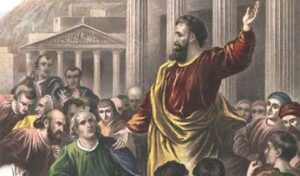We pray in this holy Mass that the Holy Spirit who is the fulfillment of all promises leads us into fullness, by making us walk in love, in an inexhaustible circle. Happy Sunday!
DOCTRINE AND FAITH
(Acts 8,5-8.14-17; Psalm 65 (66); 1 Peter 3,15-18; John 14,15-21, 6th Sunday of Easter Year A, May 14, 2023
In this Easter season, the liturgy accompanies our journey towards Pentecost making us linger over the so-called farewell discourses in John. Jesus, in the imminence of his death (which for him represents his return to the Father and for the disciples the outpouring of the Spirit), makes promises that found the future of the community. Often, the verbs in these Gospel passages are in the future. We listen to these texts after celebrating Easter and it is as if the liturgy were giving us a suggestion: meeting the Risen One in our daily life means perceiving the initial fulfillment of these promises of him, in us, and among us. It is the fulfillment of the promise, in fact, at least in a germinal way, that allows us to encounter the Risen One and to recognize him as present in our history. This was the experience lived by the disciples on Easter day, according to John's account in chapter 20.
When the Lord comes in the midst of his own, in the place where they were with the doors closed for fear of the Jews (John 2019), they will also be able to recognize him through the contemplation of the promises of the Supper, which are being fulfilled: the Lord's promise to return so as not to leave them orphans; that of being able to see him again and thus understand how he and the Father are one; the promise of peace, joy and, above all, of the Holy Spirit, which the Risen One now breathes upon them (cf. John 20,19-23).
This experience of the first disciples remains current: meeting the Risen One means savoring his promise which is fulfilled in us and among us. The promise in which all the others are unified is that of the Spirit, who (Jesus promises) will be given by the Father, who hears the prayer of the Son, so that the Spirit himself may remain with you forever (John 14,16). He is the other Paraclete, declares Jesus, suggesting that the first Paraclete is himself. John will later make this allusion explicit in his First Letter: If anyone has sinned, we have a Paraclete with the Father: Jesus Christ, the righteous (1 John 2,1). Paraclete, literally, is he who is called so close (ad-vocatus, in Latin): the lawyer, the defender, the witness in favor, the comforter, because he does not leave us alone but defends us, supports us, and encourages us in our daily spiritual warfare. The first Paraclete, Jesus, is the one who remained with the disciples for a part of their journey, because, like every human person, he was born and died within a short period and in a small portion of the earth. The Spirit, on the other hand, remains forever, updating and interiorizing this presence of the Risen One in the life of the community and of each of its members, in every era of history and every corner of the earth. In the Spirit, Christ lives in us, and we in him. Peter also recalls it, in his letter, inviting believers to adore Christ in their hearts. In the Spirit, the Risen One dwells there, And forever. In the Greek in which John writes, this expression - forever - however takes on a much different dimension. It should be more faithfully translated: He will remain with you until eternal fulfillment. It is much more, then, than a chronological indication; it expresses the fullness towards which the Spirit leads us. His is a dynamic forever; he remains in us and we remain in him, not firm, static, or immovable: we remain on a path that leads us towards that fullness which is the communion in love between the Father and the Sons, on that day you will know that I am in my Father and you in me and I in you (John 14,20). The Spirit is the fulfillment of all promises, but he fulfills them by making us walk, and walk in love, in an inexhaustible circle. By welcoming Jesus' word, we welcome the new commandment, which allows us to be able to love as he has loved us. By walking in this love - thanks to the energy that is released from the commandment - we will love the Lord more and more, and he will return to manifest himself to us in an ever-new way, renewing his word and his commandment in us. The new word and commandment will thus return to increase our ability to love. It is a virtuous spiral that does not end. In fact - Gregory of Nyssa affirms in his homilies on the Song of Songs -: He who ascends never ceases to pass from beginning to beginning, and the beginning of higher realities never ends. It is the Spirit who is to lead us into fullness, and fullness is inexhaustible! This is the foundation of our hope (says Peter), of which we must be able to give an account to anyone who asks us. It is a foundation that does not remain external to our life but is within us. Indeed, the foundation is the word of Jesus, that commandment of him that John defines as entole, literally that which is placed within us, like a spring that gushes unstoppable. It is the water of the Spirit in which we were baptized; and the energy of the Spirit in which we have been confirmed, as Acts reminds us today; it is an ever-new beginning that continues to fulfill Jesus' promises for us and the world. + John I. Okoye.


